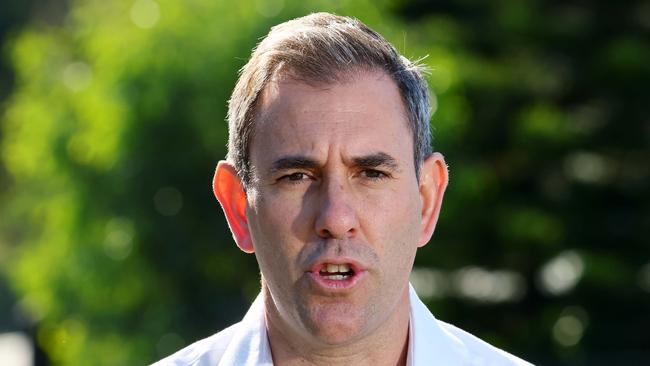Jim Chalmers says economy is on track for ‘soft landing’
Jim Chalmers says Australia is on track for a ‘soft landing’ that will see inflation back under control without ‘crunching the economy’.

Jim Chalmers says Australia is on track for a “soft landing” that will see inflation brought back under control without “crunching the economy”, even as more economists say persistent price pressures will delay rate cuts until next year.
The Treasurer in a speech on Wednesday morning will attack critics of his May budget, which revealed expanded cost-of-living support as part of $9.5bn in extra spending in the coming financial year that some experts said risked adding to inflationary pressures.
Following calls by Liberal MPs for cost-cutting to lower ballooning structural deficits, Dr Chalmers will warn against austerity measures at a time of flat economic growth and high interest rates.
National accounts figures last week revealed a near-stalling economy in early 2024 and the weakest annual growth in more than three decades, outside the pandemic, prompting the Treasurer to say “it is clear how misguided the hawkish pre-budget commentary was”.
“In this environment it would be irresponsible to slash and burn and cut too much. Our more balanced approach is tackling inflation without crunching the economy,” he will say.
ANZ head of Australian economics Adam Boyton on Tuesday became the latest analyst to push back mortgage relief into early next year, blaming in part the ongoing support from strong government spending, as well as unexpected strength in consumption and a resilient labour market.
“It’s not that monetary policy isn’t working – it is,” Mr Boyton said.
“The economy has clearly slowed. It’s for this reason that we think a rate hike remains unlikely. However, getting an appropriate balance between the level of demand and supply is likely to take a little longer than expected.”
As polls show Peter Dutton making ground on Anthony Albanese, opposition Treasury spokesman Angus Taylor on Tuesday said the Coalition’s budget plan would put a speed limit on taxes through a tax-to-GDP cap, ensure the economy grows faster than government spending and “return the budget to structural balance, not windfall surplus”.
Mr Taylor said the Coalition economic plan would “end the waste and inflation-fuelling spending … More spending will lead to higher inflation. Most Australian families don’t feel like they’re getting value for money on that extra spending.”
Dr Chalmers in his speech will emphasise that Labor’s fiscal strategy is tailored for the times.
“An economy still growing, inflation coming back to band, unemployment with a 4 in front of it, tax cuts and rising wages supporting a gradual recovery in consumption, and a sensible approach to budget repair to buffer us against uncertainty,” he will say.
“This is the soft landing we are cautiously confident of, but not complacent about.”
However, flatlining economic growth and stubbornly strong inflation are further restricting the central bank’s so-called “narrow path” to bring cost of living back under control without tipping the nation into recession.
The Council of Financial Regulators – which includes top officials from the Reserve Bank, Treasury, Australian Securities & Investments Commission and the Australian Prudential Regulation Authority – in its quarterly meeting discussed the rising levels of personal and business insolvencies as households and firms struggle with high interest rates and stubbornly elevated inflation.
ASIC figures show that the number of Australian firms going under is set to push above 10,000 in this financial year for the first time since 2012-13, led by failures in a construction industry struggling to deal with rising material costs and a shortage of labour.
Despite the sharp upwards trend in insolvencies, the corporate watchdog says they remain well below historical levels after accounting for the fact that the number of companies has increased from just over two million a decade ago to 3.3 million today.
As a share of registered firms, failure rates will be an estimated 0.3-0.33 per cent in this financial year, against 0.53 per cent in 2012-13, ASIC says.
Still, with about 1000 businesses going bust every month, the trend is sharply higher, and NAB’s monthly corporate survey revealed corporate confidence slipped into negative territory in May as conditions worsened.
Despite this, the report also revealed Australian businesses were passing on intensifying cost pressures to their customers, in further bad news for the RBA ahead of its next board meeting next week.
NAB chief economist Alan Oster said the bank’s monthly survey suggested the economic weakness at the start of the year had extended into the June quarter, and that consumer firms were “bearing the brunt as households adjust their spending behaviour”.
The overall message was “a mixed one for the RBA”, Mr Oster said.
“There are warning signs on the outlook for growth, but at the same time reasons to be very wary about the inflation outlook.
“We expect the RBA to keep rates on hold for some time yet as they navigate through these contrasting risks,” he said.





To join the conversation, please log in. Don't have an account? Register
Join the conversation, you are commenting as Logout